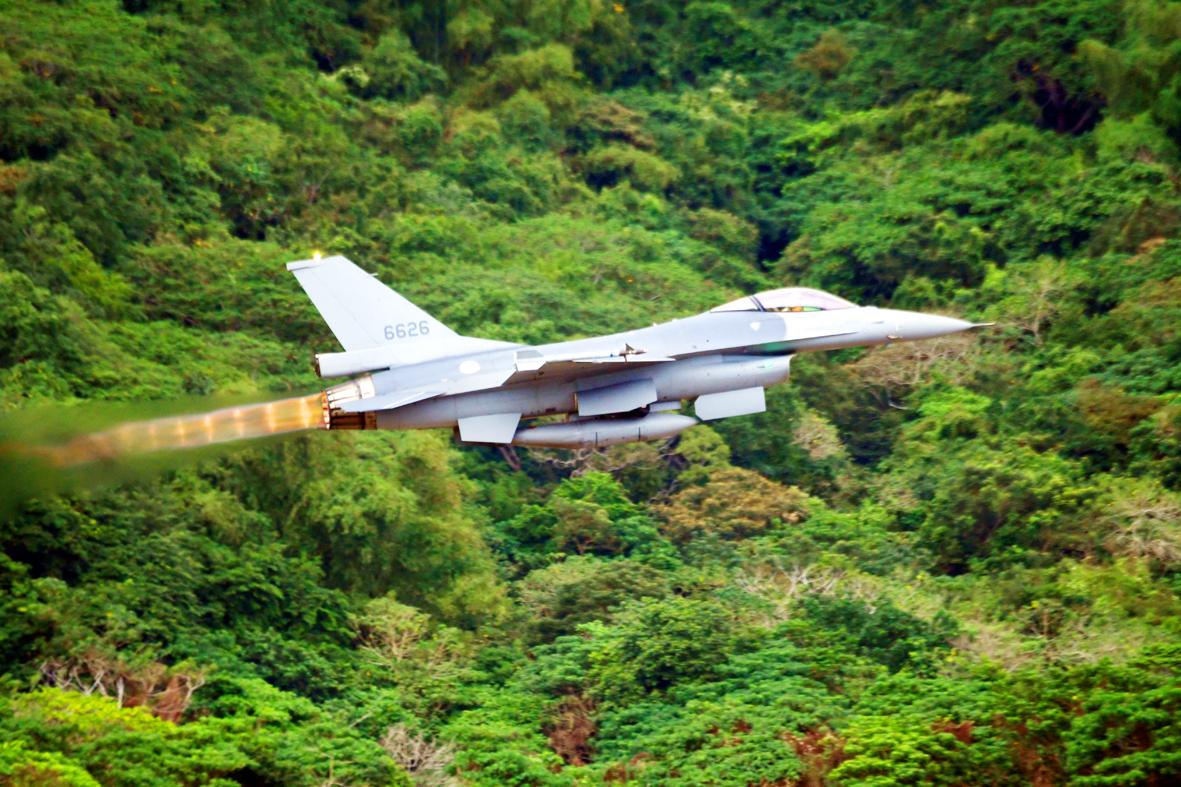The government budget for fiscal 2021 could see national defense spending increase to NT$335.8 billion (US$11.36 billion), up NT$10 billion, or 3 percent, from fiscal 2020, sources said on Friday.
If the NT$29 billion in special funding to purchase F-16 jets from the US were included, the increase in the national defense budget would be 7 percent, the sources said, adding that the military’s purchase of 66 F-16s is expected to cost NT$247.29 billion and be paid off in seven years.
The Ministry of National Defense is discussing with the Executive Yuan additional funding to purchase advanced weaponry, they said.

Photo: You Tai-lang, Taipei Times
Premier Su Tseng-chang (蘇貞昌) next month is expected to present President Tsai Ing-wen (蔡英文) with the final Directorate-General of Budget, Accounting and Statistics (DGBAS) estimate on the government’s fiscal 2021 budget, they said, adding that the final decision would be made pending a discussion between the two.
Equipment purchases, and maintenance and personnel fees comprise the main expenditures in the defense budget, although details cannot be divulged, an Executive Yuan source said.
An official speaking on condition of anonymity said that the increase in the defense budget would be within normal parameters, as an exponential increase would breach the Budget Act (預算法).
The public construction budget for fiscal 2021, including a second-phase infusion into the Forward-looking Infrastructure Development Program, and other funds for state-owned enterprises and a non-profit businesses fund, is estimated to be NT$500 billion, a 10 percent rise from fiscal 2020, sources said.
Flagship projects include the Ministry of Economic Affairs’ Circular Economy Industrial Park and the Ministry of Transportation and Communications’ third terminal project at Taiwan Taoyuan International Airport, the sources said.
Research and development for technology might comprise 3 percent of public construction expenditure, they said.
Tax revenue for fiscal 2021, estimated at NT$2 trillion, down NT$100 billion from fiscal 2020 due to the COVID-19 pandemic, might lead to a deficit, the DGBAS said.
In the event of a deficit, the government would have to take on debt, DGBAS Director-General Chu Tzer-ming (朱澤民) said.

Right-wing political scientist Laura Fernandez on Sunday won Costa Rica’s presidential election by a landslide, after promising to crack down on rising violence linked to the cocaine trade. Fernandez’s nearest rival, economist Alvaro Ramos, conceded defeat as results showed the ruling party far exceeding the threshold of 40 percent needed to avoid a runoff. With 94 percent of polling stations counted, the political heir of outgoing Costa Rican President Rodrigo Chaves had captured 48.3 percent of the vote compared with Ramos’ 33.4 percent, the Supreme Electoral Tribunal said. As soon as the first results were announced, members of Fernandez’s Sovereign People’s Party

MORE RESPONSIBILITY: Draftees would be expected to fight alongside professional soldiers, likely requiring the transformation of some training brigades into combat units The armed forces are to start incorporating new conscripts into combined arms brigades this year to enhance combat readiness, the Executive Yuan’s latest policy report said. The new policy would affect Taiwanese men entering the military for their compulsory service, which was extended to one year under reforms by then-president Tsai Ing-wen (蔡英文) in 2022. The conscripts would be trained to operate machine guns, uncrewed aerial vehicles, anti-tank guided missile launchers and Stinger air defense systems, the report said, adding that the basic training would be lengthened to eight weeks. After basic training, conscripts would be sorted into infantry battalions that would take

GROWING AMBITIONS: The scale and tempo of the operations show that the Strait has become the core theater for China to expand its security interests, the report said Chinese military aircraft incursions around Taiwan have surged nearly 15-fold over the past five years, according to a report released yesterday by the Democratic Progressive Party’s (DPP) Department of China Affairs. Sorties in the Taiwan Strait were previously irregular, totaling 380 in 2020, but have since evolved into routine operations, the report showed. “This demonstrates that the Taiwan Strait has become both the starting point and testing ground for Beijing’s expansionist ambitions,” it said. Driven by military expansionism, China is systematically pursuing actions aimed at altering the regional “status quo,” the department said, adding that Taiwan represents the most critical link in China’s

‘REALLY PROUD’: Nvidia would not be possible without Taiwan, Huang said, adding that TSMC would be increasing its capacity by 100 percent Nvidia Corp CEO Jensen Huang (黃仁勳) on Saturday praised and lightly cajoled his major Taiwanese suppliers to produce more to help power strong demand for artificial intelligence (AI), capping a visit to the country of his birth, where he has been mobbed by adoring fans at every step. Speaking at an impromptu press conference in the rain outside a Taipei restaurant, where he had hosted suppliers for a “trillion-dollar dinner,” named after the market capitalization of those firms attending, Huang said this would be another good year for business. “TSMC needs to work very hard this year because I need a lot